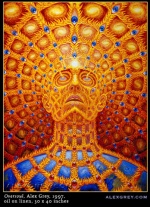Over-Soul
Over-Soul is a term used by Ralph Waldo Emerson in an essay first published in 1841, which is regarded as one of his best. For him, the Over-Soul is a supreme underlying unity which transcends plurality, much in the way non-dual philosophies describe reality. Helena Petrovna Blavatsky used this term as a synonym for anima mundi or ālaya, at a macrocosmic level, and for buddhi in human beings.
Emerson and the Over-Soul
Emerson's essay deals with the existence and nature of the human soul; its relationship with the personal ego; the relationship between the seemingly different human souls; and the relationship of the soul to God.
He believed that through the Over-Soul every individual soul is “part or parcel of God.” Since we are part of God, we can find truth in without depending on external guidance. As he wrote in his essay:
The Supreme Critic on the errors of the past and the present, and the only prophet of that which must be, is that great nature in which we rest, as the earth lies in the soft arms of the atmosphere; that Unity, that Over-soul, within which every man's particular being is contained and made one with all other; that common heart.[1]
It is because of the existence of this Over-Soul that all human beings share a common essence.
Over-Soul in Theosophy
Mme. Blavatsky had Emerson's essay in high regard, referring to it as "his superb Essay on The Over-Soul".[2] She used this term in some of her writings, although in a somewhat different way. She agreed the Over-Soul was the common essence of all individual souls but did not regarded it as the highest principle in the cosmos (which is the Absolute or Universal Spirit, the seventh Principle, the root of everything). She wrote that the Third Fundamental Proposition of the The Secret Doctrine establishes:
The fundamental identity of all Souls with the Universal Over-Soul, the latter being itself an aspect of the Unknown Root.[3]
This, however, should not be interpreted as meaning the Over-Soul is different from the Universal Spirit. As Mme. Blavatsky wrote:
For us there is no over-soul or under-soul; but only ONE—substance: the last word being used in the sense Spinoza attached to it; calling it the ONE Existence, we cannot limit its significance and dwarf it to the qualification “over”; but we apply it to the universal, ubiquitous Presence, rejecting the word ‘Being,’ and replacing it with “All-Being.”[4]
The Over-Soul is regarded to be the sixth Principle in the cosmos, ālaya, the universal soul. It is a collective indivisible Soul of which all individual souls are rays or sparks. Its present in human beings is buddhi, which serves as the vehicle of atman:
As a general law, the Highest God, the Over-soul of the human being (Atma-Buddhi), only over-shadows the individual during his life, for purposes of instruction and revelation; or as Roman Catholics–who erroneously call that Over-soul the “Guardian Angel”–would say, “It stands outside and watches.”[5]
At the present stage of evolution the Over-Soul does not normally have an active presence in the personal consciousness. However, by means of Raja Yoga, the "human soul" or manas can be united to the Over-Soul, forming what is called "Buddhi-Manas".[6] The person then becomes a mystic and occultist.
Artistic representations

Alex Grey, an American artist specializing in "visionary art", painted an artwork in 1997 entitled Oversoul, in oil on linen. The dimensions are 30 x 40 inches.
Notes
- ↑ Ralph Waldo Emerson, The Over-soul, from Essays: First and Second Series, ([New York]: A.L. Burt Co., [1922?]), 190-213.
- ↑ Helena Petrovna Blavatsky, Collected Writings vol. II (Wheaton, IL: Theosophical Publishing House, ???), 96.
- ↑ Helena Petrovna Blavatsky, The Secret Doctrine vol. I, (Wheaton, IL: Theosophical Publishing House, 1993), 17.
- ↑ Helena Petrovna Blavatsky, Collected Writings vol. X (Wheaton, IL: Theosophical Publishing House, 1989), 10, fn.
- ↑ Helena Petrovna Blavatsky, Collected Writings vol. XIV (Wheaton, IL: Theosophical Publishing House, 1988), 48.
- ↑ Helena Petrovna Blavatsky, The Theosophical Glossary (Krotona, CA: Theosophical Publishing House, 1973), 257.
Further reading
- The Over-Soul at American Transcendentalism Web